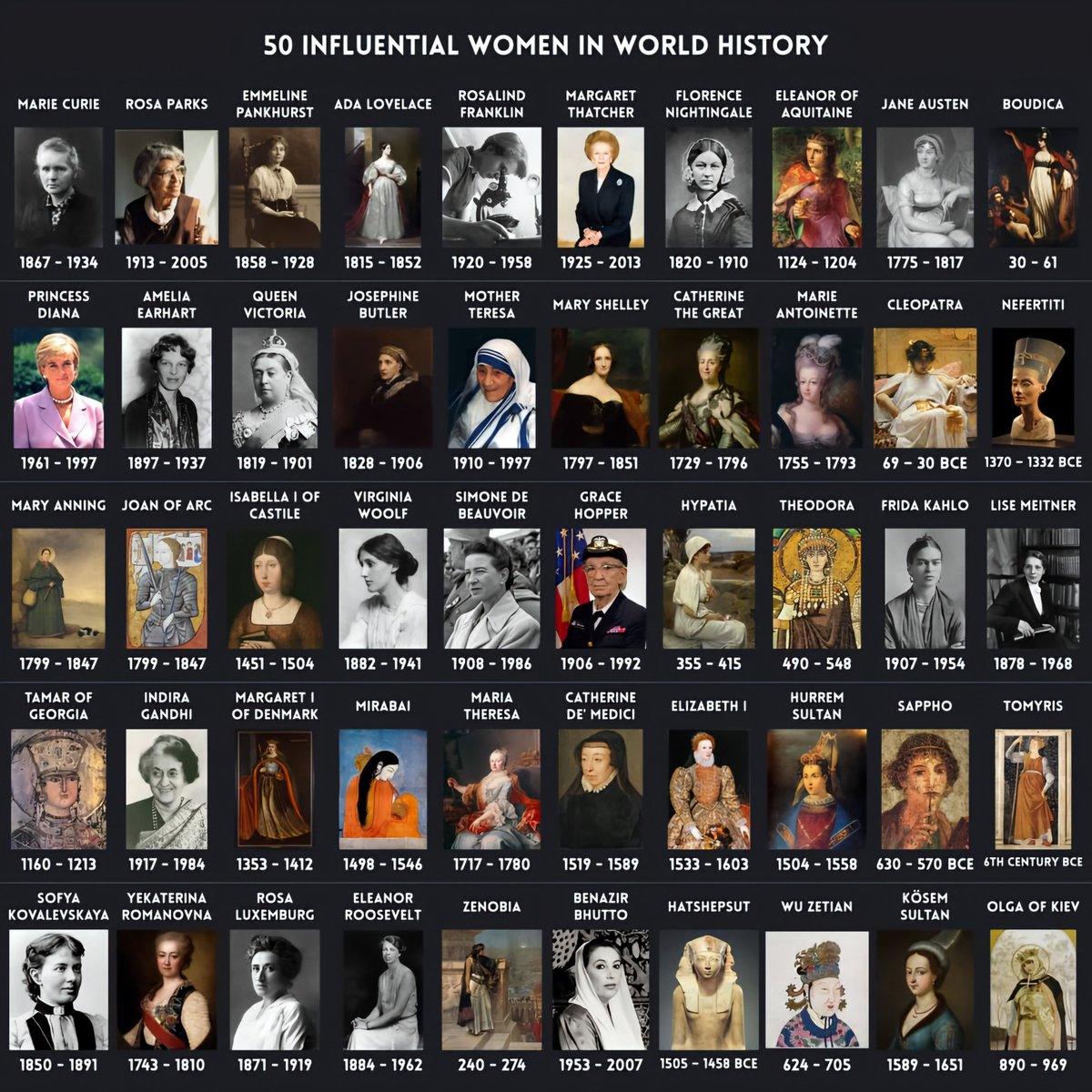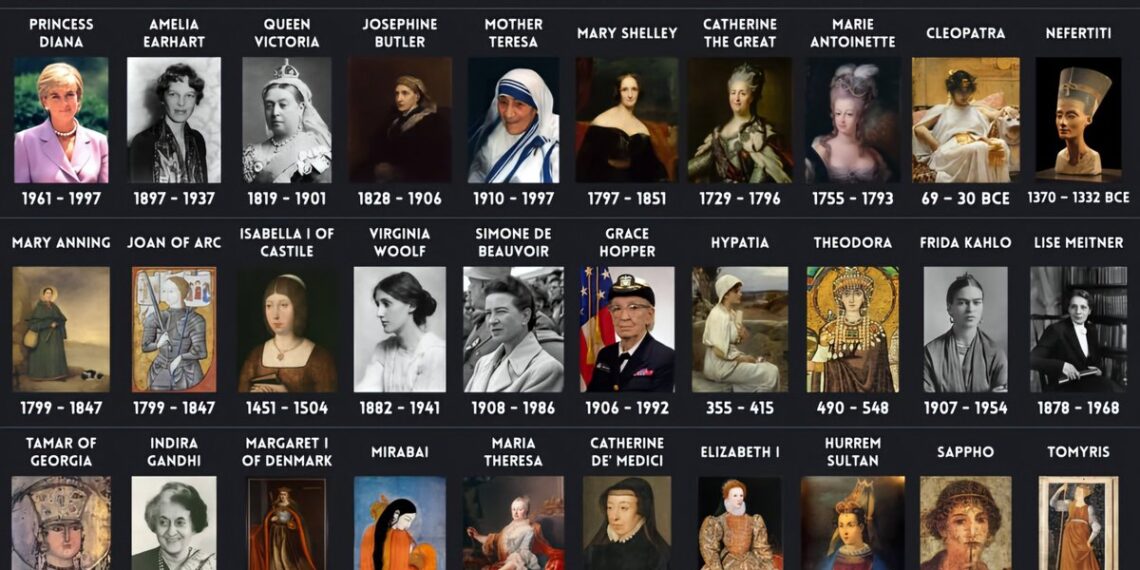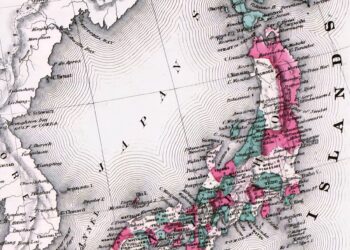Select Language:

When we reflect on the trajectory of history, one undeniable truth surfaces: women have played a pivotal role in shaping our world. From science and politics to literature and social reform, the influence of women has transcended borders and cultural contexts. Let’s take a closer look at 50 remarkable women whose contributions have left a lasting impact on history.
Marie Curie (1867–1934)
Polish-born physicist and chemist, Marie Curie was the first woman to win a Nobel Prize and remains the only person to win in two different scientific fields—Physics and Chemistry. Her research on radioactivity opened doors to new medical treatments and advanced scientific understanding.
Rosa Parks (1913–2005)
An iconic figure in the American Civil Rights Movement, Rosa Parks is best known for her act of defiance against racial segregation when she refused to give up her bus seat. Her courage became a catalyst for the Montgomery Bus Boycott and a symbol of the struggle for civil rights.
Emmeline Pankhurst (1858–1928)
A leader of the British suffragette movement, Emmeline Pankhurst fought tirelessly for women’s right to vote. Her bold strategies and public speeches galvanized a generation of women in their fight for equality.
Ada Lovelace (1815–1852)
Often considered the first computer programmer, Ada Lovelace developed algorithms for Charles Babbage’s early mechanical general-purpose computer. Her foresight into the capabilities of computers was revolutionary, laying the groundwork for future technological advancements.
Rosalind Franklin (1920–1958)
While her contributions to the discovery of DNA were overlooked during her lifetime, Rosalind Franklin’s X-ray diffraction images were crucial in uncovering DNA’s structure, significantly influencing modern genetics.
Margaret Thatcher (1925–2013)
The first female Prime Minister of the United Kingdom, Margaret Thatcher was known for her conservative policies and strong leadership during a pivotal era in British history, often referred to as the “Iron Lady” for her uncompromising political stance.
Florence Nightingale (1820–1910)
A pioneer in nursing, Florence Nightingale transformed healthcare practices with her emphasis on sanitation and patient care. She founded the first school for nurses and her work significantly improved medical standards.
Eleanor of Aquitaine (1124–1204)
One of the most powerful women of the Middle Ages, Eleanor of Aquitaine was queen consort of both France and England. She played key roles in the politics of both kingdoms, influencing the course of European history.
Jane Austen (1775–1817)
An influential author, Jane Austen’s novels expertly critiqued the British landed gentry of her time. Her sharp wit and keen observations of societal norms continue to resonate with readers today.
Boudica (30–61)
A fierce warrior queen, Boudica led a significant uprising against Roman rule in Britain. Her legacy as a symbol of resistance and courage has inspired countless generations.
Princess Diana (1961–1997)
Renowned for her charity work, particularly with HIV/AIDS and landmines, Princess Diana’s compassion and openness made her a beloved public figure, exemplifying the power of empathy in leadership.
Amelia Earhart (1897–1937)
As the first woman to fly solo across the Atlantic Ocean, Amelia Earhart became an enduring symbol of courage and adventure, inspiring many to pursue their dreams, regardless of societal constraints.
Queen Victoria (1819–1901)
Reigning over the British Empire during a time of industrial and cultural expansion, Queen Victoria’s influence on society, art, and politics shaped an era known for its advancements and changes.
Josephine Butler (1828–1906)
An early feminist and social reformer, Josephine Butler advocated for women’s rights, particularly in relation to sexual health and education, becoming a key figure in the campaign against the Contagious Diseases Acts.
Mother Teresa (1910–1997)
Awarded the Nobel Peace Prize, Mother Teresa dedicated her life to serving the poor and the sick. Her compassion and selflessness have made her a model for humanitarian action worldwide.
Mary Shelley (1797–1851)
Best known for her novel “Frankenstein,” Mary Shelley challenged societal norms through her exploration of themes such as creation and moral responsibility, making significant contributions to both literature and feminist thought.
Catherine the Great (1729–1796)
The longest-serving female leader of Russia, Catherine the Great expanded the empire and modernized various aspects of Russian society, earning a reputation as one of history’s most influential monarchs.
Marie Antoinette (1755–1793)
The last Queen of France before the French Revolution, Marie Antoinette’s life and death have become symbols of the excesses of the monarchy, providing a historical lesson on the disconnect between rulers and their subjects.
Cleopatra (69–30 BCE)
Known for her intelligence and political acumen, Cleopatra was the last active ruler of the Ptolemaic Kingdom of Egypt. Her alliances with Rome made her a key figure in the tumultuous politics of her time.
Nefertiti (1370–1332 BCE)
An iconic figure in ancient Egypt, Nefertiti served as both queen and wife to Pharaoh Akhenaten. Her beauty and power were immortalized in art, and she remains a significant figure in discussions of female leadership in ancient history.
Mary Anning (1799–1847)
A pioneering paleontologist, Mary Anning made significant contributions to the field while overcoming the limitations placed on women in science. Her discoveries in fossil hunting shaped our understanding of prehistoric life.
Joan of Arc (1412–1431)
Led the French army to victory during the Hundred Years’ War, Joan of Arc became a martyr after her execution. Her bravery has made her a historical icon representing faith and perseverance.
Isabella I of Castile (1451–1504)
As Queen of Castile, Isabella played a crucial role in financing Christopher Columbus’s voyages, leading to the discovery of the New World and influencing the course of history.
Virginia Woolf (1882–1941)
An influential modernist author and feminist icon, Virginia Woolf’s writing challenged societal norms and explored the inner lives of women, contributing significantly to literary and feminist thought.
Simone de Beauvoir (1908–1986)
A foundational figure in feminist philosophy, Simone de Beauvoir’s work “The Second Sex” examined women’s oppression and has profoundly influenced feminist theory and existentialism.
Grace Hopper (1906–1992)
A computer scientist and U.S. Navy Rear Admiral, Grace Hopper was a pioneer in computer programming and played a significant role in developing COBOL, one of the first modern programming languages.
Hypatia (355–415)
As a renowned astronomer and mathematician in ancient Alexandria, Hypatia became a symbol of the pursuit of knowledge during a time when women were often excluded from scholarly pursuits.
Theodora (490–548)
The influential wife of Byzantine Emperor Justinian I, Theodora played an active role in political affairs and was a staunch advocate for women’s rights, notably improving their status in society.
Frida Kahlo (1907–1954)
A celebrated artist and feminist icon, Frida Kahlo’s poignant self-portraits explored themes of identity, postcolonialism, gender, and class, offering a powerful voice for the marginalized.
Lise Meitner (1878–1968)
A physicist who contributed to the discovery of nuclear fission, Lise Meitner faced significant prejudice in her field yet made groundbreaking strides in science, exemplifying resilience in the face of adversity.
Tamar of Georgia (1160–1213)
As one of the greatest monarchs of Georgia, Tamar’s reign was marked by cultural and territorial expansion, earning her the revered title of the “King of Kings.”
Indira Gandhi (1917–1984)
As India’s first and only female Prime Minister, Indira Gandhi played a key role in Indian politics, overseeing major reforms and navigating complex global relations.
Margaret I of Denmark (1353–1412)
A powerful ruler in the Scandinavian kingdoms, Margaret I unified Denmark, Norway, and Sweden under her rule, shaping the future of Northern Europe.
Mirabai (1498–1546)
A poet and devotee of Krishna, Mirabai broke social norms by expressing her spirituality and devotion through her songs, making significant contributions to the Bhakti movement in India.
Maria Theresa (1717–1780)
The only female ruler of the Habsburg dominions, Maria Theresa implemented significant reforms in education, governance, and the military, transforming her empire.
Catherine de Medici (1519–1589)
An influential queen consort of France, Catherine de Medici played a critical role in the French Wars of Religion, navigating complex political landscapes and leaving a lasting legacy.
Elizabeth I (1533–1603)
A formidable monarch, Elizabeth I’s reign marked the Elizabethan Era, known for English cultural renaissance and the defeat of the Spanish Armada, solidifying her legacy as one of England’s greatest rulers.
Hurrem Sultan (1503–1558)
The wife of Suleiman the Magnificent, Hurrem Sultan rose to power within the Ottoman Empire, influencing politics and being a key patron of the arts.
Sappho (630–570 BCE)
An ancient Greek poet, Sappho is renowned for her profound and emotional lyric poetry, influencing literature and providing a powerful voice for women throughout history.
Tomyris (6th century BCE)
The legendary queen of the Massagetae, Tomyris is celebrated for her military leadership and her resistance against Cyrus the Great, making her a historical figure of strength.
Sofya Kovalevskaya (1850–1891)
As the first woman to obtain a doctorate in mathematics in modern Europe, Sofya Kovalevskaya made significant contributions to mathematics and became an advocate for women’s education.
Yekaterina Romanovna (1743–1810)
As the first Russian empress, Yekaterina Romanovna was instrumental in shaping the empire and is remembered for her patronage of the arts and reform of education.
Rosa Luxemburg (1871–1919)
A Marxist theorist and revolutionary, Rosa Luxemburg advocated for social justice and is regarded as a key figure in the early socialist movement, emphasizing the importance of democracy and freedom.
Eleanor Roosevelt (1884–1962)
As First Lady and a prominent human rights advocate, Eleanor Roosevelt’s work in the United Nations and her commitment to social justice transformed the role of women in politics.
Zenobia (240–274)
The fierce queen of Palmyra, Zenobia led a revolt against the Roman Empire and sought to expand her territory, becoming a symbol of resistance and strength.
Benazir Bhutto (1953–2007)
The first woman to lead a Muslim-majority country, Benazir Bhutto faced numerous challenges as Pakistan’s Prime Minister but remained a significant figure in global discussions on women’s empowerment.
Hatshepsut (1505–1458 BCE)
One of ancient Egypt’s most successful pharaohs, Hatshepsut reigned during a period of peace and economic prosperity, challenging gender norms as she solidified her power.
Wu Zetian (624–705)
The only female emperor in Chinese history, Wu Zetian implemented significant reforms, promoting education and consolidating power, leaving a lasting legacy in Chinese governance.
Kösem Sultan (1589–1651)
An influential figure in the Ottoman Empire, Kösem Sultan wielded considerable power as a regent, shaping the empire’s politics during a critical period.
Olga of Kiev (890–969)
A powerful and shrewd leader, Olga of Kiev avenged her husband’s death and introduced Christianity to her people, establishing a lasting legacy as one of the earliest female rulers in Eastern Europe.
Throughout history, these women have demonstrated extraordinary courage, intelligence, and resilience. Their legacies continue to inspire and empower future generations as we acknowledge their vital contributions to society.






